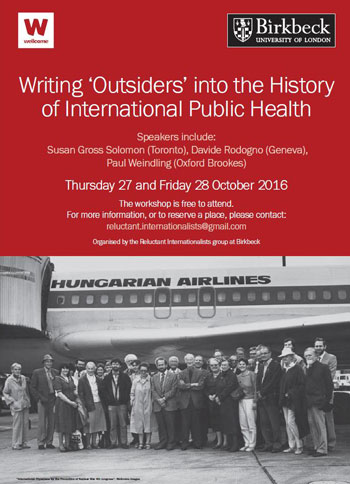 Workshop Report – Writing “Outsiders” into the History of International Public Health, Birkbeck 27-28 October 2016
Workshop Report – Writing “Outsiders” into the History of International Public Health, Birkbeck 27-28 October 2016
Earlier this term, Birkbeck played host to a two-day symposium examining the history of international public health. Writing “Outsiders” into the History of International Public Health brought together over twenty scholars from the UK, Europe, the US and Canada, setting out to examine what impact factoring in “outsiders” would make to the way historians write the history of international public health. In addition, the workshop sought to ask what close study of “outsiders” and the processes of marginalisation can tell us about the international system of public health – its rules (written and unwritten), its reach, and its commitment to inclusiveness?
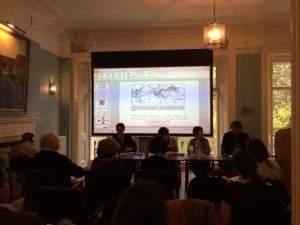 The first panel addressed the theme of ‘giving and taking’ with Jessica Reinisch (Birkbeck) examining the political geography of UNRRA’s donating and receiving countries, noting how the notions of ‘us’ and ‘them’ acted as an important binary for relief work (podcast). Lion Murard (French National Centre for Scientific Research) then focused upon Greek and Eastern European international health during the inter-war period, including a focus on the Americanisation of European public health (podcast). Following this, Yitang Lin, Thomas David and Davide Rodogno (University of Lausanne and University of Geneva) provided an introductory overview of The Rockefeller Fellows and Fellowship Programmes in Public Health database project, noting that fellows could often be both ‘outsiders’ and ‘insiders’ simultaneously (podcast). All of the papers prompted discussion on the political dimensions of international health, including who was an ‘outsider’ in relation to medical staff within UNRRA and amongst the fellows of the Rockefeller programme (Panel discussion).
The first panel addressed the theme of ‘giving and taking’ with Jessica Reinisch (Birkbeck) examining the political geography of UNRRA’s donating and receiving countries, noting how the notions of ‘us’ and ‘them’ acted as an important binary for relief work (podcast). Lion Murard (French National Centre for Scientific Research) then focused upon Greek and Eastern European international health during the inter-war period, including a focus on the Americanisation of European public health (podcast). Following this, Yitang Lin, Thomas David and Davide Rodogno (University of Lausanne and University of Geneva) provided an introductory overview of The Rockefeller Fellows and Fellowship Programmes in Public Health database project, noting that fellows could often be both ‘outsiders’ and ‘insiders’ simultaneously (podcast). All of the papers prompted discussion on the political dimensions of international health, including who was an ‘outsider’ in relation to medical staff within UNRRA and amongst the fellows of the Rockefeller programme (Panel discussion).
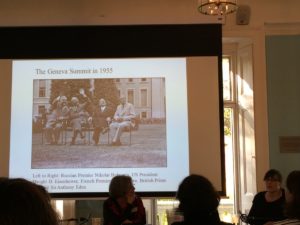 The second panel examined Soviet Russia during the inter-war years. Susan Gross-Solomon (Toronto) addressed Soviet public health schemes, arguing that Soviet public health was accepted unevenly outside of Russia throughout the whole period and thus Soviet medical professionals can be viewed as suffering from issues of both superiority and inferiority. She suggested the notion of ‘outsider’ or ‘insider’ was therefore perhaps too binary a distinction to make (podcast). Johanna Conterio (Birkbeck) then presented on socialist design in Black Sea resorts, exploring urban planning from a medical and public health perspective. Her paper examined Soviet models of prosperity and the way in which the Soviets presented this case of prosperity from planning in international settings, specifically in relation to the 1958 Congress of the International Architectural Union in Moscow (podcast). Sarah Marks (Birkbeck) followed, using psychiatry and mental health to explore Czechoslovakia’s ‘outsider’ status during the Cold War. She argued that whilst historiographically Czechoslovakia is an outsider, it can be viewed as an insider in many ways and her paper therefore advocated for the necessity of writing medicine and science back into the history of Czechoslovakia in order to understand its role within the broader Soviet sphere (podcast). All three papers prompted discussion on the extent of the performative aspect of ‘insiders’ and ‘outsiders’ as labels in relation to international gatherings and congresses, as well as to what extent the Soviets can be classified as having truly been ‘outsiders’ during this period (Panel discussion).
The second panel examined Soviet Russia during the inter-war years. Susan Gross-Solomon (Toronto) addressed Soviet public health schemes, arguing that Soviet public health was accepted unevenly outside of Russia throughout the whole period and thus Soviet medical professionals can be viewed as suffering from issues of both superiority and inferiority. She suggested the notion of ‘outsider’ or ‘insider’ was therefore perhaps too binary a distinction to make (podcast). Johanna Conterio (Birkbeck) then presented on socialist design in Black Sea resorts, exploring urban planning from a medical and public health perspective. Her paper examined Soviet models of prosperity and the way in which the Soviets presented this case of prosperity from planning in international settings, specifically in relation to the 1958 Congress of the International Architectural Union in Moscow (podcast). Sarah Marks (Birkbeck) followed, using psychiatry and mental health to explore Czechoslovakia’s ‘outsider’ status during the Cold War. She argued that whilst historiographically Czechoslovakia is an outsider, it can be viewed as an insider in many ways and her paper therefore advocated for the necessity of writing medicine and science back into the history of Czechoslovakia in order to understand its role within the broader Soviet sphere (podcast). All three papers prompted discussion on the extent of the performative aspect of ‘insiders’ and ‘outsiders’ as labels in relation to international gatherings and congresses, as well as to what extent the Soviets can be classified as having truly been ‘outsiders’ during this period (Panel discussion).
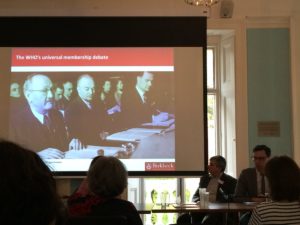 The third panel of the day centred attention on the history of public health in the so-called ‘outsider’ states of Franco’s Spain, Nazi Germany, and Greece. David Brydan (Birkbeck) addressed Franco Spain’s relationship with the World Health Organisation during the immediate post-WWII period and the country’s isolation on the international stage. The paper noted that it is during this period that Spain can be most clearly viewed as an international outsider. Consequently, the paper examined the means through which Francoist Spain attempted to align itself internationally and its attempts to integrate into mainstream international health networks and organisations (podcast). Paul Weindling (Oxford Brookes) then spoke on Germany as an outsider in international public health under Nazism, addressing the topic of the Nazi vision to create a German-led European public health system and focusing on Nazi initiatives during the Second World War (podcast). Following this, Maria Zarifi (Hellenic Open University) presented on public health in the construction of Greece in the late nineteenth century. Her paper centred around the notion of modernity in relation to medical scientists in Greece and, in turn, how this went hand in hand with the development of the Greek state (podcast). The panel discussion that followed incorporated debate upon the centrality of public health to state building and the role of nationalism in international public health (Panel discussion).
The third panel of the day centred attention on the history of public health in the so-called ‘outsider’ states of Franco’s Spain, Nazi Germany, and Greece. David Brydan (Birkbeck) addressed Franco Spain’s relationship with the World Health Organisation during the immediate post-WWII period and the country’s isolation on the international stage. The paper noted that it is during this period that Spain can be most clearly viewed as an international outsider. Consequently, the paper examined the means through which Francoist Spain attempted to align itself internationally and its attempts to integrate into mainstream international health networks and organisations (podcast). Paul Weindling (Oxford Brookes) then spoke on Germany as an outsider in international public health under Nazism, addressing the topic of the Nazi vision to create a German-led European public health system and focusing on Nazi initiatives during the Second World War (podcast). Following this, Maria Zarifi (Hellenic Open University) presented on public health in the construction of Greece in the late nineteenth century. Her paper centred around the notion of modernity in relation to medical scientists in Greece and, in turn, how this went hand in hand with the development of the Greek state (podcast). The panel discussion that followed incorporated debate upon the centrality of public health to state building and the role of nationalism in international public health (Panel discussion).
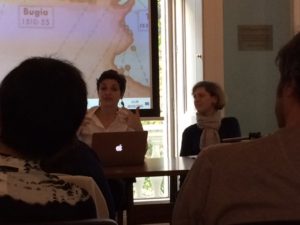 On the second day, the final panel of the workshop addressed inclusion and exclusion in international health networks. Jessica Pearson (Macalester) presented on colonial outsiders in international public health, with specific focus on colonial France and its relations with the WHO. She argued that France’s refusal to allow the WHO to operate in its colonial territories was due to the broader context of the French perceiving the involvement of any international organisation in their African empire as a threat to French colonial sovereignty (podcast). Dora Vargha (Exeter) then spoke on determining who were ‘insiders’ and ‘outsiders’ in the World Health Organisation. Her paper questioned if international health always occurs through international structures. Through examining Eastern European states, she argued that leaving the WHO did not result in isolation and an end to collaborations in the field of international public health (podcast). Following this, Ana Antic (Exeter) presented on the links between socialist Eastern Europe and the decolonising world. Her paper focused in particular upon examining alternative socialist internationalism through the prism of psychiatry and mental health, as evidenced through the case study of a group of Yugoslav psychiatrists in Guinea (podcast). After the three papers, discussion centred upon life beyond the WHO, both for colonial powers and for many socialist states. In addition, debate turned to the importance of distinguishing between global public health and international public health (Panel discussion).
On the second day, the final panel of the workshop addressed inclusion and exclusion in international health networks. Jessica Pearson (Macalester) presented on colonial outsiders in international public health, with specific focus on colonial France and its relations with the WHO. She argued that France’s refusal to allow the WHO to operate in its colonial territories was due to the broader context of the French perceiving the involvement of any international organisation in their African empire as a threat to French colonial sovereignty (podcast). Dora Vargha (Exeter) then spoke on determining who were ‘insiders’ and ‘outsiders’ in the World Health Organisation. Her paper questioned if international health always occurs through international structures. Through examining Eastern European states, she argued that leaving the WHO did not result in isolation and an end to collaborations in the field of international public health (podcast). Following this, Ana Antic (Exeter) presented on the links between socialist Eastern Europe and the decolonising world. Her paper focused in particular upon examining alternative socialist internationalism through the prism of psychiatry and mental health, as evidenced through the case study of a group of Yugoslav psychiatrists in Guinea (podcast). After the three papers, discussion centred upon life beyond the WHO, both for colonial powers and for many socialist states. In addition, debate turned to the importance of distinguishing between global public health and international public health (Panel discussion).
The workshop concluded with a roundtable discussion addressing what difference adding outsiders makes to the way historians write the history of public health and the history of internationalism more broadly. In addition, discussions also examined what happens when we put public health into the history of international organisations and international relations, and vice versa. Similarly, debate revolved around questioning the adequacy of existing standard narratives of international public health and the ways in which historians can instead tell these narratives from below. A podcast of this roundtable discussion is available here.
